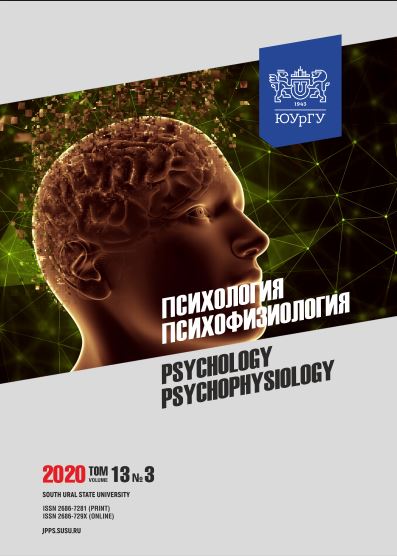PSYCHOLOGICAL TIME AND SELF-EFFICACY OF THE INDIVIDUAL
Abstract
Background: The article presents the features of psychological time as one of the factors of self-efficacy of the individual. The belief in the efficacy of one’s own actions is an indicator of the potential success of a person. Attention is paid to various aspects of psychological time, which provide a high subject and interpersonal self-efficacy of the individual. Aim. This paper aims to determine the relationship between the self-efficacy of the individual and the components of psychological time, including the features of time perspective, personal competence in time and exposure to time disruptors. Materials and methods. The following questionnaires were used: the subject and interpersonal self-efficacy test, the time perspective questionnaire, the diagnostics of personal disorganizers and personal competence in time. The data obtained were subjected to correlation analysis with the Spearman coefficient. Results. The self-efficacy of a person is higher in the following conditions: goals and plans for the future are more expressed; perception of ones own past as filled with negativity and disappointments is less pronounced; the attitude to the present as independent of the subject's will is less pronounced. Interpersonal self-efficacy of a person is promoted by: orientation to setting life goals and future prospects; ability to getting one’s affairs in order, problem concentrating, showing interest in life and work. Conclusion. Subjects with high indicators of self-efficacy in both the subject and interpersonal spheres are characterized by: a high level of personal competence in time; low indicators of time disruptors. Subjects with high self-efficacy only in subject activities are characterized by: a high level of focus on the future; acceptance of their past without pain and frustration; perception of their present as dependent on their will and aspirations. Subjects with primary self-efficacy in interpersonal relationships are characterized by: the formation of life goals and intentions, the ability to see personal
perspectives, an indifferent attitude to work, and the desire for activity. The results of the study can be used for correctional, developmental, and advisory psychological support for improving self-efficacy in individuals.
Downloads
References
2. Ananyev B.G. Chelovek kak predmet poznaniya [Man as a subject of knowledge]. Moscow, Publishing house Peter, 2001, 288 p. (in Russ.).
3. Golovakha E.I., Kronik A.A. Psikhologicheskoe vremya lichnosti [Psychological time of personality]. Moscow, Smysl, 2008. 267 p. (in Russ.).
4. Derevyanko Yu.P. [Features of the experience of time in the students age]. Nauchnye vedomosti Belgorodskogo gosudarstvennogo universiteta. Seriya: Gumanitarnye nauki [Scientific bulletin of Belgorod State University. Humanities Sciences], 2010, no. 18 (89), pp. 313–318. (in Russ.).
5. Zimbardo F., Boyd D. Paradoks vremeni: novaya psikhologiya vremeni, kotoraya uluchshit vashu zhizn [The paradox of time: a new psychology of time that improves your life]. Saint-Petersburg, Rech, 2010. 349 p. (in Russ.).
6. Krichevsky R.L. [Self-efficacy and acmeological approach to research personality]. Akmeologiya [Acmeology], 2001, no. 1, pp. 47–52. (in Russ.).
7. Kuzmina O.V. [Method of diagnostics of personal time disruptors]. Psikhologicheskie issledovaniya [Psychological research], 2011, no. 6 (20), p. 12. URL: http://psystudy.ru (accessed 24.12.2019). (in Russ.).
8. Leonov A.A., Lebedev V.I. Vospriyatie prostranstva i vremeni v kosmose [Perception of space and time in space]. Moscow, Nauka, 1968. 116 p. (in Russ.).
9. Novikov Yu.Yu. [Time in Henri Bergsons philosophy]. Metafizika [Metaphysics], 2013, no. 5 (7), pp. 21–28. (in Russ.).
10. Richterman T.D. Formirovanie predstavlenii o vremeni u detei [Development of young childrens timeconcepts]. Moscow, Prosvyaschenie, 1991. 45 p. (in Russ.).
11. Serenkova V.F. Tipologicheskie osobennosti planirovaniya lichnostnogo vremeni [Typological features of personal time planning]. Gumanisticheskie problemy psikhologicheskoi teorii [Humanistic problems of psychological theory]. Moscow, Nauka, 1995. pp. 192–204. (in Russ.).
12. Syrtsova A., Sokolova E.T., Mitina O.V. [Zimbardos method for time perspective]. Psikhologicheskaya diagnostika [Psychol. Diagnostics], 2007, no. 1, pp. 85–106. (in Russ.).
13. Bandura A. Self-efficacy mechanism in human agency. American Psychologist, 1982, vol. 37, pp. 122–147.
References on translit
-Copyright (c) 2020 Psychology. Psychophysiology

This work is licensed under a Creative Commons Attribution-NonCommercial-NoDerivatives 4.0 International License.



